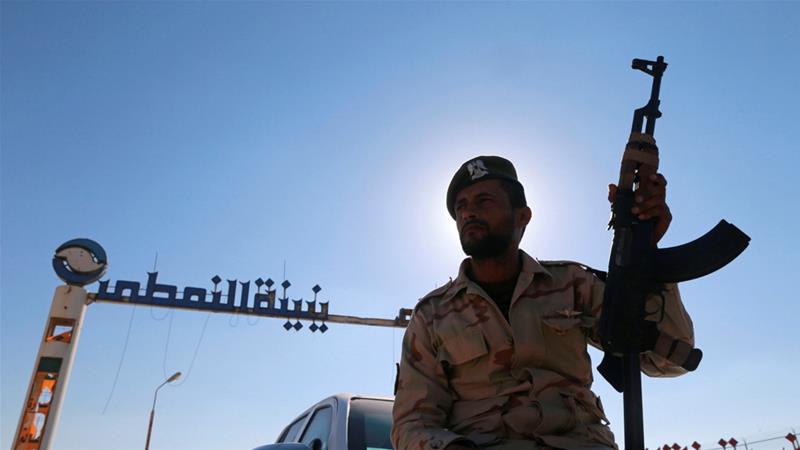Home » Middle East »
Libya: GNA launch offensive to capture al-Watiya airbase
Tripoli forces reportedly seize control of parts of al-Watiya, captured in 2014 by renegade commander Khalifa Haftar.
Soldiers from Libya’s internationally recognised Government of National Accord (GNA) attacked an airbase controlled by the forces of renegade military commander Khalifa Haftar.
The operation was launched early on Tuesday by troops loyal to the Tripoli-based GNA, which managed to seize control of major parts of the al-Watiya airbase, southwest of the capital, sources said.
More:
-
Libya’s renegade commander Khalifa Haftar announces Ramadan truce
-
Turkey: Haftar ‘aims to create military dictatorship’ in Libya
-
UAE officials ‘visit Sudan’ to rally support for Libya’s Haftar
Al Jazeera’s Mahmoud Abdelwahed, reporting from Tripoli, said Haftar’s Libyan National Army (LNA) was forced back to the southern part of the key airbase.
He added the two sides were exchanging heavy fire.
“This battle for al-Watiya has been prepared for by government forces over the past few weeks, by air strikes from government drones targeting Haftar’s forces and locations in and around al-Watiya airbase,” he said.
The airbase has been used to launch air raids on forces loyal to the GNA. It is regarded as a key facility in the country and was captured in August 2014 by Haftar – who used it as his headquarters for launching operations in Libya’s west.
A GNA source, who spoke on condition of anonymity, said heavy artillery paved the way for troops to launch the ground offensive. “Clashes are raging on near the base,” the source told Anadolu news agency.
Libya’s Al-Ahrar TV cited an unnamed government military official as saying the head of Haftar’s forces at the airbase was killed in the operation.
“The commander of the Al-Watiya protection force of the Haftar terrorist militia, Osama Meseik, was killed in an attack by government forces on the base,” he said. It was not possible to immediately confirm the claim.
Oil-rich Libya has been engulfed in chaos since 2011 when longtime leader Muammar Gaddafi was killed in a NATO-backed uprising.
It is now split between two rival administrations: The GNA and the eastern-based House of Representatives allied to Haftar.
Haftar’s fighters have suffered a series of setbacks in recent weeks in their year-long campaign to seize Tripoli, with pro-GNA forces expelling them from two key coastal cities west of the capital.
The LNA’s military defeats have coincided with Turkey’s entrance into the conflict, and its use of weaponised drones targetting Haftar’s troops and supply lines.
Next phase
Jason Pack, from the Libya Analysis think-tank, highlighted the shift in air superiority with Turkish drones now dominating the skies, and said the GNA would further strengthen its hand if it regains control of the airbase.
But he told Al Jazeera the LNA still would be a powerful force to be reckoned with.
“Haftar’s ability to rule eastern Libya and the power he has over many tribes in the centre of the country will not be changed. Rather, the next phase of the civil war would start,” said Pack.
“Haftar’s made some mistakes, some of these even comical, but unfortunately he’s going to be where he’s going to be until his health or the international geopolitics changes.”
Turkey on Tuesday called on all powers supporting Haftar to “rethink their position and invest” in the Libyan government.
“Thanks to Turkey’s support for the legitimate government of Libya, the destabilising and illegitimate Haftar forces are losing ground in Libya. All those powers supporting Haftar must rethink their position and invest in the legitimate government for peace and stability,”Fahrettin Altun, Turkey‘s communications director, said on Twitter.
Turkish President Recep Tayyip Erdogan said on Monday “good new news from Libya will be returned to us soon, God willing”.
“Libya’s security, safety and prosperity of its people is the key to stability in the entire North African and Mediterranean region,” he said.
Peace talks?
In a statement, Fayez al-Serraj, the head of the GNA, called on all Libyan parties to swiftly resume political dialogue brokered by the United Nations.
He called for a comprehensive roadmap and political process, either through amending a 2015 political agreement and forming a presidential council with a separate prime minister, or conducting a general election in the near future.
The GNA rejected Haftar’s unilateral call for a ceasefire during the Muslim holy month of Ramadan for fear he would use the truce as an opportunity to regroup.
Last month, the United Nations, the European Union and several countries called on Libya’s warring sides to lay down their arms during Ramadan.
Haftar launched a war to capture Tripoli a year ago, advancing into the southern suburbs before his offensive stalled, and his forces, backed by the United Arab Emirates (UAE), Egypt and Russia, have continually bombarded the capital.
The pro-GNA forces have pushed the LNA back from some areas in the northwest and repeatedly attacked its supply lines with the help of Turkish-supplied drones.
Start Here
What’s happening with the war in Libya? | Start Here
Source: Read Full Article




